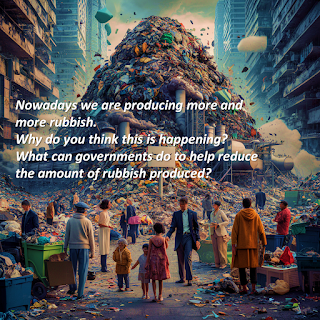Nowadays we are producing more and more rubbish.
Why do you think this is happening?
What can governments do to help reduce the amount of rubbish produced?
Give reasons for your answer and include any relevant examples from your own knowledge or experience.
Write at least 250 words.
In this concurrent era, out of numerous issues facing our society, the escalating problem of excessive waste generation has become one of the most pressing concerns. I believe this issue has been brought about by several factors including population growth and unsustainable consumption patterns, which can be resolved by implementing stringent regulations and promoting sustainable practices.
To commence with the causes, the increasing production of waste can be primarily attributed to the expanding global population and rapid urbanization. As more people inhabit urban areas and adopt modern lifestyles, there is a corresponding rise in the demand for goods and services, leading to greater consumption and consequently, increased waste generation. Furthermore, the prevalence of disposable and single-use items in today's consumer culture exacerbates this issue, contributing significantly to the accumulation of non-biodegradable waste. Additionally, inadequate waste management practices and insufficient recycling infrastructure further compound the problem.
(Note the words and phrases I have used to talk about reasons....
1) XYZ problem can be primarily attributed to (reason)
2) Something (reason) exacerbates the issue of (the given issue)
3) XYZ reasons further compound the problem
To address these challenges, governments can play a pivotal role in implementing comprehensive solutions. One key strategy involves the enactment and enforcement of stringent regulations aimed at reducing waste production and promoting sustainable practices. For instance, by imposing bans or levying taxes on single-use plastics and non-recyclable materials, policymakers can incentivize businesses and consumers to adopt more eco-friendly alternatives. Moreover, raising public awareness and improving education can be crucial steps in eradicating the issue from its roots.
(Note the words and phrases I have used to talk about reasons....
1) (Somebody/something) can play a pivotal role in solving (the given issue)
2) One key strategy to solve the issue involves...
3) Something/someone can be crucial steps in eradicating the issue.
To sum up, the issue of excessive waste generation stems from unsustainable practices and inadequate waste management infrastructure. Not until governments bring stringent regulations and prioritize public engagement, will the problem be fully resolved.


This post was enjoyable to me. It provided insightful information, and I'm eager to put some of your suggestions into practice. I appreciate your sharing.
ReplyDeletejava with DSA course
The blog is very helpful
ReplyDeleteSoftcrayons Best digital marketing course
ReplyDeleteNice Blog
For More Information Contact Us: https://growmyybusiness.com/
Best barber in surrey
ReplyDelete